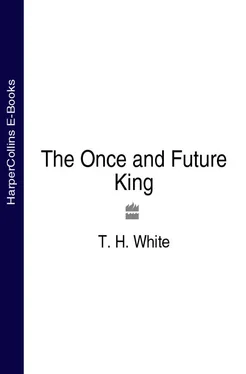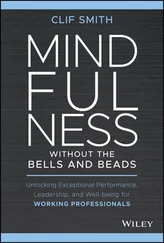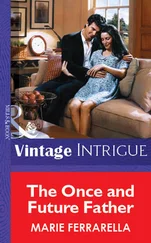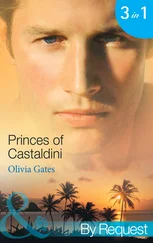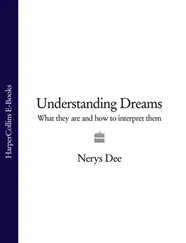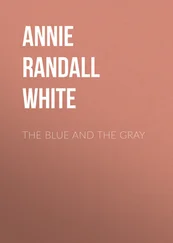It was an easy stalk, except for its danger. The bushes thinned and the sounding bracken grew rarely in the swampy earth, so that they could move three times as fast. They went in a dream, unguided by owl’s hoot or bat’s squeak, but only kept together by the necessary pace which the sleeping forest imposed upon them. Some of them were fearful, some revengeful for their comrade, some, as it were, disbodied in the sleep-walk of their stealth.
They had hardly crept for twenty minutes when Maid Marian paused in her tracks. She pointed to the left.
Neither of the boys had read the book of Sir John de Mandeville, so they did not know that a griffin was eight times larger than a lion. Now, looking to the left in the silent gloom of night, they saw cut out against the sky and against the stars something which they never would have believed possible. It was a young male griffin in its first plumage.
The front end, and down to the forelegs and shoulders, was like a huge falcon. The Persian beak, the long wings in which the first primary was the longest, and the mighty talons: all were the same, but, as Mandeville observed, the whole eight times bigger than a lion. Behind the shoulders, a change began to take place. Where an ordinary falcon or eagle would content itself with the twelve feathers of its tail, Falco leonis serpentis began to grow the leonine body and the hind legs of the beast of Africa, and after that a snake’s tail. The boys saw, twenty-four feet high in the mysterious night-light of the moon, and with its sleeping head bowed upon its breast so that the wicked beak lay on the breast feathers, an authentic griffin that was better worth seeing than a hundred condors. They drew their breath through their teeth and for the moment hurried secretly on, storing the majestic vision of terror in the chambers of remembrance.
They were close to the castle at last, and it was time for the outlaws to halt. Their captain touched hands silently with Kay and Wart, and the two went forward through the thinning forest, towards a faint glow which gleamed behind the trees.
They found themselves in a wide clearing or plain. They stood stock still with surprise at what they saw. It was a castle made entirely out of food, except that on the highest tower of all a carrion crow was sitting, with an arrow in its beak.
The Oldest Ones of All were gluttons. Probably it was because they seldom had enough to eat. You can read even nowadays a poem written by one of them, which is known as the Vision of Mac Conglinne. In this Vision there is a description of a castle made out of different kinds of food. The English for part of the poem goes like this:
A lake of new milk I beheld
In the midst of a fair plain.
I saw a well-appointed house
Thatched with butter.
Its two soft door-posts of custard,
Its dais of curds and butter,
Beds of glorious lard,
Many shields of thin pressed cheese.
Under the straps of those shields
Were men of soft sweet smooth cheese,
Men who knew not to wound a Gael,
Spears of old butter had each of them.
A huge cauldron full of meat
(Methought I’d try to tackle it),
Boiled, leafy kale, browny-white,
A brimming vessel full of milk.
A bacon house of two-score ribs,
A wattling of tripe – support of clans –
Of every food pleasant to man,
Meseemed the whole was gathered there.
Of chitterlings of pigs were made
Its beautiful rafters,
Splendid the beams and the pillars
Of marvellous pork.
The boys stood there in wonder and nausea, before just such a stronghold. It rose from its lake of milk in a mystic light of its own – in a greasy, buttery glow. It was the fairy aspect of Castle Chariot, which the Oldest Ones – sensing the hidden knife blades after all – had thought would be tempting to the children. It was to tempt them to eat.
The place smelt like a grocer’s, a butcher’s, a dairy and a fishmonger’s, rolled into one. It was horrible beyond belief – sweet, sickly and pungent – so that they did not feel the least wish to swallow a particle of it. The real temptation was, to run away.
However, there were prisoners to rescue.
They plodded over the filthy drawbridge – a butter one, with cow hairs still in it – sinking to their ankles. They shuddered at the tripe and the chitterlings. They pointed their iron knives at the soldiers made of soft, sweet, smooth cheese, and the latter shrank away.
In the end they came to the inner chamber, where Morgan le Fay herself lay stretched upon her bed of glorious lard.
She was a fat, dowdy, middle-aged woman with black hair and a slight moustache, but she was made of human flesh. When she saw the knives, she kept her eyes shut – as if she were in a trance. Perhaps, when she was outside this very strange castle, or when she was not doing that kind of magic to tempt the appetite, she was able to assume more beautiful forms.
The prisoners were tied to pillars of marvellous pork.
‘I am sorry if this iron is hurting you,’ said Kay, ‘but we have come to rescue our friends.’
Queen Morgan shuddered.
‘Will you tell your cheesy men to undo them?’
She would not.
‘It is magic,’ said the Wart. ‘Do you think we ought to go up and kiss her, or something frightful like that?’
‘Perhaps if we went and touched her with the iron?’
‘You do it.’
‘No, you.’
‘We’ll go together.’
So they joined hands to approach the Queen. She began to writhe in her lard like a slug. She was in agony from the metal.
At last, and just before they reached her, there was a sloshing rumble or mumble – and the whole fairy appearance of Castle Chariot melted together in collapse, leaving the five humans and one dog standing together in the forest clearing – which still smelt faintly of dirty milk.
‘Gor-blimey!’ said Friar Tuck. ‘Gor blimey and coo! Dash my vig if I didn’t think we was done for!’
‘Master!’ said Dog Boy.
Cavall contented himself with barking wildly, biting their toes, lying on his back, trying to wag his tail in that position, and generally behaving like an idiot. Old Wat touched his forelock.
‘Now then,’ said Kay, ‘this is my adventure, and we must get home quick.’
But Morgan le Fay, although in her fairy shape she could not stand iron, still had the griffin. She had cast it loose from its golden chain, by a spell, the moment her castle disappeared.
The outlaws were pleased with their success, and less careful than they should have been. They decided to take a detour round the place where they had seen the monster tied up, and marched away through the darksome trees without a thought of danger.
There was a noise like a railway train letting off its whistle, and, answering to it – riding on it like the voice of the Arabian Bird – Robin Wood’s horn of silver began to blow.
‘Tone, ton, tavon, tontavon, tantontavon, tontantontavon,’ went the horn. ‘Moot, troot, trourourout, troutourourout. Trout, trout. Tran, tran, tran, tran.’
Robin was blowing his hunting music and the ambushed archers swung round as the griffin charged. They set forward their left feet in the same movement and let fly such a shower of arrows as it had been snow.
The Wart saw the creature stagger in its tracks, a clothyard shaft sprouting from between the shoulder-blades. He saw his own arrow fly wide, and eagerly bent to snatch another from his belt. He saw the rank of his companion archers sway as if by a preconcerted signal, when each man stooped for a second shaft. He heard the bow-strings twang again, the purr of the feathers in the air. He saw the phalanx of arrows gleam like an eyeflick in the moonlight. All his life up to then he had been shooting into straw targets which made a noise like Phutt! He had often longed to hear the noise that these clean and deadly missiles would make in solid flesh. He heard it.
Читать дальше
